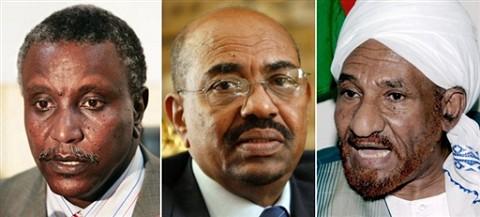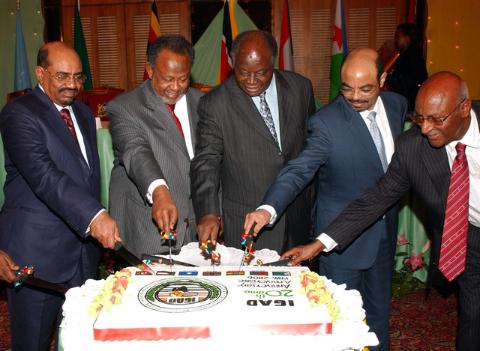

From: Berhane Habtemariam (Berhane.Habtemariam@gmx.de)
Date: Tue Mar 09 2010 - 07:56:46 EST
SPLM's Presidential Candidate Expects Polls to End of Status Quo in Khartoum
The presidential candidate of the Sudan's People Liberation Movement (SPLM)
is calling for a "complete paradigm shift" from Sudan's old politics that he
says destabilized the entire Horn of Africa region.
Peter Clottey 09 March 2010
Leading candidates in Sudan's first multiparty presidential election, from
left, Yasir Arman, Omar al-Beshir and Sadiq al-Mahdi (file photos)
Photo: AFP
Leading candidates in Sudan's first multiparty presidential election, from
left, Yasir Arman, Omar al-Beshir and Sadiq al-Mahdi
"We are looking for the election to be free and fair. The only way to do it
is to (embark) on a massive campaign that depends on people in urban and
rural areas. We should be calling for transformation and democratization.
Democracy will not come by itself (and) it needs us to struggle for it,"
The presidential candidate of the Sudan's People Liberation Movement (SPLM)
is calling for a "complete paradigm shift" from Sudan's old politics that he
says destabilized the entire Horn of Africa region.
For Yasir Arman, that means winning the presidency of the central government
in Khartoum, a position now held by President Omar Bashir of the ruling
National Congress Party (NCP).
The SPLM's stronghold is in southern Sudan, an area many observers also
expect the party to win.
According to the 2005 Comprehensive Peace Agreement signed between the
national government and the SPLM, the south will be allowed to hold a
referendum two years from now to decide whether to remain part of Sudan, or
to form a separate nation.
Yasir Arman says "[Southerners] should be very optimistic, especially the
SPLM.we stand a good chance [the national elections]."
"The only way to guarantee their freedom and the only way to guarantee their
right is to work to transform the system in Khartoum. That is the sure way
of getting freedom. It is only through transforming the seat of power in
[the capital]," Arman said.
The SPLM candidate, who traces his roots to diverse backgrounds and tribes
in Sudan, was born in 1961 in Jezeera, about 180 kilometers (111.846 miles)
from the capital, Khartoum.
The national media reports that Arman can trace his family's roots in Sudan
to the mid-1800's, before the Mahdist [Islamic] rebellion against British
rule in the 1880's. His great, great grandparents migrated from Damael
state near Shendi to Jezeera and Khartoum.
Arman studied law at the Khartoum branch of Cairo University in 1996.
Shortly afterward, he joined the SPLM where he quickly rose through the
ranks to become a member of the party's Political Bureau and National
Council.
He reportedly stayed at Iowa State University during the summer of 2007
where he improved his English skills by taking classes at the Intensive
English and Orientation Program under the guidance of his educational
consultant, John House, who is also a tutor at the university.
Arman is married to Awuor Deng Kuol. They have two daughters, Shanaa,18, and
Wafaa,13.
In December 2009, Arman was arrested with other SPLM partisans after they
demanded more democratic reforms from President Hassan Bashir's government
during at a protest march in the capital.
The SPLM's Political Bureau nominated Arman to lead the party in the general
elections scheduled for April after Salva Kiir, chairman of the party and
Riek Marchar, the party's vice president, reportedly declined to be
candidates.
Arman and other opposition parties recently accused President Bashir's
ruling National Congress Party (NCP) of intimidation and plotting to rig the
upcoming vote - - charges the NCP denies.
He expressed hope that the vote will be free despite the challenges the
Independent Electoral Commission faces.
"We are looking for the election to be free and fair. The only way to do it
is to (embark) on a massive campaign that depends on people in urban and
rural areas. We should be calling for transformation and democratization.
Democracy will not come by itself (and) it needs us to struggle for it," he
said.
He often says that there is need for a "new Sudan" where the citizens have
the right and the freedom to choose their own leaders.
Kenyan Legislator Says Regional Countries Are Concerned About Tensions in
Sudan
The chairman of Kenya's parliamentary committee on foreign affairs says a
summit of heads of states of the Inter-governmental Authority on Development
(IGAD) scheduled to begin Tuesday will review Sudan's 2005 Comprehensive
Peace Agreement (CPA).
Peter Clottey 08 March 2010
http://media.voanews.com/images/480*351/IGAD1.jpg
Photo: REUTERS
Some IGAD regional leaders
"What the heads of state or heads of government will be attempting to do is
to do some sort of formative and summative evaluation on how the
implementation has been carried out the issues that have been contentious.
Like the issue of wealth sharing. Like the issue of how the election is
going to be conducted. So in general, it is going to be a comprehensive
review of the entire peace agreement,"
The chairman of Kenya's parliamentary committee on foreign affairs says a
summit of heads of states of the Inter-governmental Authority on Development
(IGAD) scheduled to begin Tuesday will review Sudan's 2005 Comprehensive
Peace Agreement (CPA).
Adan Keynan said regional countries are expressing concern about tensions in
Sudan ahead of the general elections scheduled for April.
"This particular meeting is coming at a time when Sudan is gearing up for a
referendum and also for an election. Kenya being one of the guarantors
actually of the Comprehensive Peace Agreement, there are a number of
critical issues, which the regional states have been jittery about. One is
what is likely to happen with the referendum. Will there be an intra and
inter southern Sudan conflict?" he said.
Sudan's Vice Presidents Ali Osman Mohammed Taha and Salva Kiir (the latter,
who is also chairman of semi-autonomous South Sudan) are scheduled to
participate in Tuesday's deliberations in Kenya's capital, Nairobi.
Lawmaker Keynan said regional leaders will take stock of the 2005 peace
accord.
"What the heads of state or heads of government will be attempting to do is
to do some sort of formative and summative evaluation on how the
implementation has been carried out the issues that have been contentious.
Like the issue of wealth sharing. Like the issue of how the election is
going to be conducted. So in general, it is going to be a comprehensive
review of the entire peace agreement," Keynan said.
IGAD is reportedly expressing concerns about the implementation of the
Southern Sudan peace agreement ahead of the April vote.
Kenya's media reports that foreign minister Moses Wetangula urged the
international community to keep its $4.8 billion pledge to help with the
full implementation of Sudan's Comprehensive Peace Agreement.
Keynan said the regional bloc has to ensure the success of the peace accord.
"What happens or what is likely to happen in Sudan is going to have a direct
effect on all the neighboring states.and because the Comprehensive Peace
Agreement was a regional peace initiative, all countries in the region are
duty bound to make sure the Comprehensive Peace Agreement succeeds," Keynan
said.
The 2005 Comprehensive Peace Agreement effectively ended more than two
decades of war between the north and south.
Prominent Kenyans Said to Come Under International Court Scrutiny
Howard Lesser 08 March 2010
A list of 20 names of figures believed most responsible for Kenya's 2008
post-election violence has been handed over to judges in the pre-trial
chamber of the International Criminal Court by ICC Chief Prosecutor Luis
Moreno Ocampo. The suspects, who have not yet been named publicly, were
culled from a longer list that was reviewed after judges asked for more
information. The list is expected to be the main catalyst for starting
Kenya's truth and reconciliation process to assign responsibility for the
violence that led to 1,300 deaths and the displacement of 300,000 Kenyans
two years ago.
Kenyan-born law professor and dean of the law school at the University of
Buffalo, Makau Mutua, says that the international focus on some of Kenya's
most prominent political and business leaders will help Kenyans put off
having to mete out justice locally amid an atmosphere of corruption and
political favoritism.
"A local tribunal essentially would put these people on the docket in
Nairobi. It is not possible to do this without collapsing the coalition
government. Number two, I would suspect that there are suspects who command
enormous sums of money, have enormous ethnic loyalties, are likely to
reignite the violence if they were indicted and tried in Nairobi. And
finally and perhaps most importantly, is the fact that any judicial process
in Nairobi is bound to be compromised by political machinations. So I do
not expect to see an effective pursuit of justice for the victims of the
violence from Nairobi," he observed.
Because he believes that a standard of corruption has permeated Kenya's
political and judiciary systems, Professor Mutua says he believes that the
most effective way for Kenyans to pursue their own local forms of justice
for the perpetrators of the 2008 violence is through the adopting of a new
constitution that will give citizens greater individual protections.
The New York State university law professor says that the purpose of
applying justice internationally on a select few also can restore a sense of
propriety and human dignity for individuals who suffered great losses in
Kenya.
"I see the International Criminal Court as the only viable venue for the
trials of some of these individuals. Now this means that we must understand
that only those who have the greatest responsibility will be tried, because
the International Criminal Court cannot try all the Kenyans who were
involved in these violations. So I think the main authors and the main
executors of the violence will face responsibility at the International
Criminal Court. We must understand that international law does not replace
domestic law. International law acts as a gentle civilizer of nations and
provides a roadmap for those nations to act or to comport their conduct with
international norms," he pointed out.
One of the concerns voiced by chief prosecutor Moreno Ocampo as he presented
the names to the court last Wednesday is that officials of Kenya's two main
political parties - the ruling PNU (Party of National Unity) and the
opposition ODM (Orange Democratic Movement) utilized personal, government,
and ethnic resources two years ago to organize and finance attacks on
civilians. Professor Mutua says the way that influence was translated into
real power varied according to the politician's standing and political
party.
"The violence that could be traced to the state is more a function of, in
my view, the PNU side, which controlled the state at the time. So that
we've seen, for example, the evidence of killings by police and other armed
forces of unarmed civilians in areas which are controlled by ODM. So I
would say that that's more of a problem for the PNU side than for the ODM
side. On the ODM side, I think there is evidence that much of the violence
was committed by militias and other youths who are organized and armed and
orchestrated by some senior officials in ODM, especially from the Rift
Valley," he noted.
A favorable response by court justices to the special prosecutor's findings
would enable the court to authorize a formal investigation of the violence,
which could ultimately bring the case to trial at the International Criminal
Court.


----[This List to be used for Eritrea Related News Only]----
